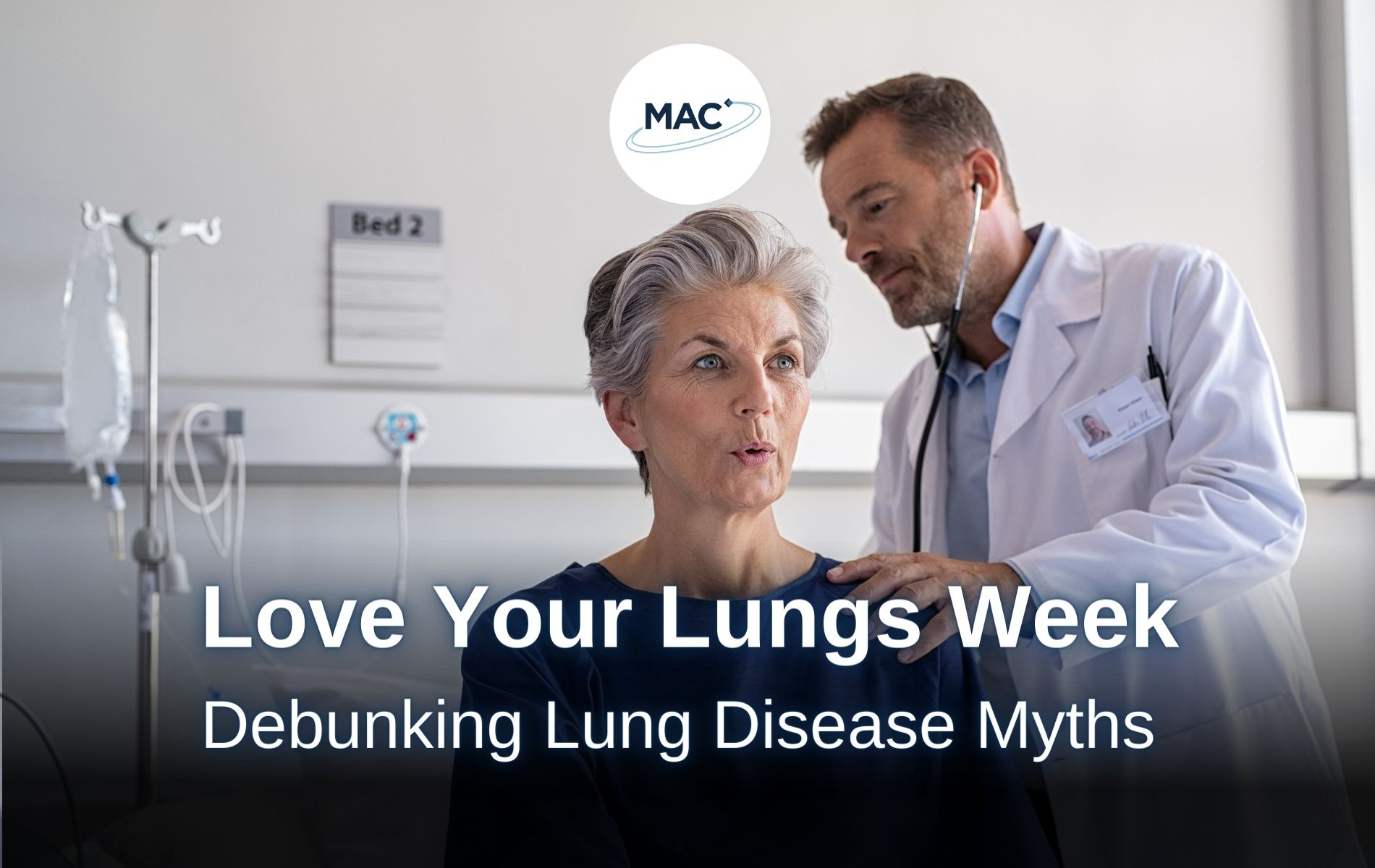This week is Love Your Lungs Week and we wanted to take this opportunity to raise awareness about lung disease and dispel common myths surrounding these conditions.
Previously known as Breathe Easy Week by the British Lung Foundation, Love Your Lungs Week is an initiative run by Asthma and Lung UK, to raise awareness and focus on lung health and will take place between the 21st and 27th June in 2023.
This year, we want to focus specifically on Chronic Obstructive Pulmonary Disease (COPD) and Idiopathic Pulmonary Fibrosis (IPF). According to the NHS, more than 3 million people live with COPD in the UK, and around 32,500 are living with IPF.
COPD refers to a group of lung conditions that cause breathing difficulties, it primarily affects middle-aged or older adults who smoke, or have smoked. IPF, on the other hand, develops when the lungs become scarred which causes breathing difficulty, often with a persistent dry cough.
Unfortunately, these diseases are often surrounded by misconceptions and myths that can lead to misunderstandings and stigma.

Myth #1: Only smokers develop Lung Disease.
Although smoking is the most common cause of COPD (according to the Centre for Disease Control and Prevention, 80% of cases are caused by smoking) many other risk factors can cause lung disease.
Some lung diseases such as Alpha-1 Antitrypsin deficiency are genetically inherited from parents.
Others such as asthma don’t have an exact known cause but recent studies have shown that children living in areas with high air pollution levels could be more at risk.
Many things can contribute to your risk of developing IPF. For instance, viral infections like COVID-19, as well as through workplace hazards, for instance breathing in dust and chemicals.

Myth #2: COPD is just a smoker’s cough.
COPD is often misunderstood as a simple smoker’s cough that will go away with time. In reality, COPD is a progressive disease meaning that it will worsen over time. A smoker’s cough, however, may be a temporary reaction to smoking that goes away when you don’t smoke, but it can also be a first sign of something more serious such as COPD.
Myth #3: lung disease only affects the elderly.

As previously mentioned, people can develop lung diseases like asthma and Alpha-1 Antitrypsin deficiency at any age.
Typically, COPD and IPF tend to affect people 40 years and older due to cumulative exposure to risk factors over time. However, younger people can also develop these conditions. Studies have shown that around 1/10 of those living with COPD are aged under 70 years old. Even more prevalent, around 80% of patients with IPF were aged under 70 according to studied conducted by the British Thoracic Society.

Myth #4: You cannot exercise with lung disease.
Although all decisions to exercise and actions should be made with consultation of a doctor or GP, people living with lung disease can exercise and it can keep you fit and healthy, reducing your chances of an exacerbation or flare-up.
Did you know? Footballers David Beckham and Paul Scholes and Team GB long-distance runner Paula Radcliffe all live with asthma.
The NHS offer a Pulmonary Rehabilitation programme for those living with conditions such as COPD and IPF, to help people better manage their condition, including symptoms of breathlessness. Around 90% of patients who completed these programmes reported higher activity and exercise levels, and improved quality of life.

Myth #5: There is nothing you can do to manage COPD and IPF.
Another misconception surrounding COPD and IPF is that there is no effective treatment or management strategy available. While there is no cure for these diseases, various interventions can significantly improve the quality of life for affected individuals.
Treatments for COPD may include steroid inhalers, pulmonary rehabilitation programs, and oxygen therapy. IPF treatment options include antifibrotic medications, pulmonary rehabilitation, supplemental oxygen, and lung transplantation in severe cases. Furthermore, lifestyle modifications such as stopping smoking, regular exercise, and a healthy diet play crucial roles in managing both conditions.
There are also currently ongoing clinical trials researching potential new treatments for these conditions. MAC Clinical Research are looking for volunteers with COPD or IPF aged 40+ to take part in their latest clinical research, which aims to improve the quality of life for those living with these debilitating conditions.
The clinical trials are running at several MAC Clinical Research clinics, primarily across the north of England. Eligible participants for the trials will receive reimbursement for their time and commitment to the trial, plus reasonable travel expenses will be paid, or transport provided, as well as a full medical check-up.
For more information on either of the trials, please visit our IPF Clinical Trials webpage or our COPD Clinical Trials webpage.






